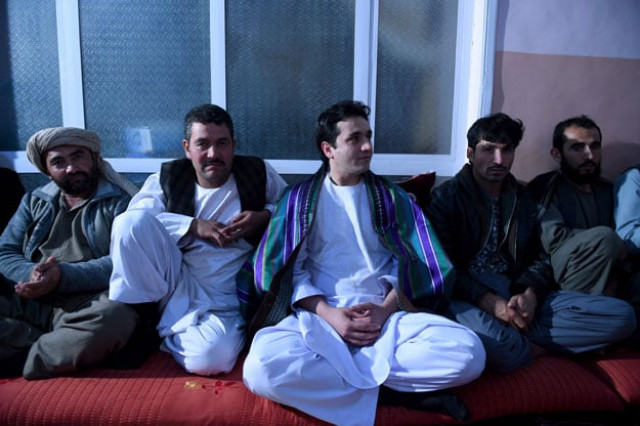Wedding revellers in Afghan village exult over Taliban rout
Villagers took up butchers' knives, homemade firearms and humiliatingly routed the Taliban

In this photograph taken on October 18, 2015, an Afghan groom (C) looks on during his wedding celebrations at Khoja Paytakht in Maimana,the capital of the northern province of Faryab. PHOTO: AFP
The village of Khoja Paytakht, on the outer fringes of Maimana, was the first line of defence that beat back the Taliban last month as insurgents sought to capture the northern city.
Taliban dissidents choose Mullah Rasool as chief
When Afghan security forces appeared to have abandoned their posts on the night of October 4, villagers were forced to snatch up butchers' knives and homemade firearms, mobilising what they call a civilian "uprising force" to stave off the insurgents.
 PHOTO: AFP
PHOTO: AFPJust days after the overnight battle, a sumptuously colourful wedding unwittingly morphed into a twin celebration of the terror and triumph against the Taliban.
After a feast of mutton pilaf, eggplant and platters of freshly peeled pomegranates, hundreds of male guests lounged on soft Persian rugs and silk bolster cushions for the highlight of the gender-segregated wedding.
Dressed in traditional shalwar kameez, male relatives and friends of the groom one by one took to the floor in the middle, their legs bound by a traditionally feminine accoutrement -- ankle bracelets braided with tiny metal bells.
The Taliban in disarray
"This celebration is like a slap in the face of the Taliban," 26-year-old groom Noor Ahmed said over the din of drums, tambourines and lutes -- while women celebrated in a separate room, hidden from the gaze of men.
 PHOTO: AFP
PHOTO: AFP"The Taliban are against any kind of lyrical, musical revelry. This is our way of telling them we will not be defeated and subdued."
The men danced with wild abandon, synchronising every twirl, every hip swivel with the high-pitched chime of the bells as the audience tossed crisp bank notes in the air, erupting in whistles, catcalls and squeals of joy.
"Oh zalim, shor beti khoda (Oh cruel one, shake your body!)," the singer hissed into the microphone in Dari, standing behind an ensemble of musicians.
"I've got the singer drunk on grape wine," joked the uncle of the groom, himself mildly inebriated.
"Now he'll sing all night," he added, provoking a ripple of titters around him.
 PHOTO: AFP
PHOTO: AFPThe Taliban rout offered a rare glimmer of good news as the insurgency spreads inexorably, deeply straining NATO-backed Afghan security forces on multiple fronts as the UN estimates that the group's reach is the widest since 2001.
The attack on Maimana was part of the rural insurgency's aggressive new push towards big cities, from Kunduz in the north to Ghazni and Lashkar Gah in the south -- forcing ordinary citizens in many areas to take up arms.
Khoja Paytakht, a patchwork of grape orchards, dry riverbeds and concrete houses built into beige hillsides, sits in a region seen as an unstable powder keg.
The Taliban were pushed back but they still remain frighteningly close, with the insurgent frontline barely a few miles away.
Afghan Taliban declare ceasefire in quake-hit areas
"They are just behind the flanking hills," said Qara, a local militia commander who provided security for the wedding, with his snipers spread across nearby hilltops and fruit orchards.
 PHOTO: AFP
PHOTO: AFPLast month's attack whipped people into a frenzy of panic as many feared the Taliban's full wrath because of the area's ethnic makeup -- mostly Uzbeks and Tajiks, who have long harboured antagonism towards the predominantly Pashtun Taliban.
"The risk of a Taliban comeback is real," said Qara, who goes by one name.
Back at the wedding, as the night wore on, the musicians worked through a repertoire of folk melodies.
Some of the groom's relatives flushed as they resisted requests to dance, but there was no escaping.
Before they knew it friends lunged at their feet, tying them down with ankle bracelets.
For cultural purists, the dance is a byword for depravity and evokes strong comparisons with the outlawed cultural practice of bacha bazi -- a Dari slang meaning "boy play".
The filthy culture of bacha bazi in Afghanistan
Still prevalent across rural Afghanistan, it is an ancient tradition in which prepubescent boys are sold as entertainers at weddings or for sexual slavery.
But this wedding involved grown men and the celebration was raucous, graceless and full of mirth.
"We won't let the Taliban win or threaten our way of life," said Ahmed, the groom.
"If they attack again, people will revolt once more with knives, shovels and pitchforks -- even if we have to lay down our lives for it."
But for this one October night there was no terror, only the triumph of the dance.



















COMMENTS
Comments are moderated and generally will be posted if they are on-topic and not abusive.
For more information, please see our Comments FAQ